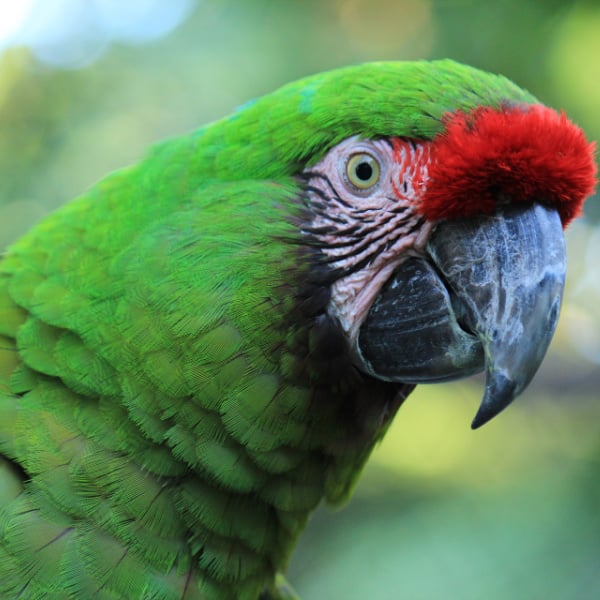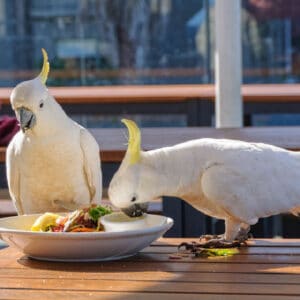Last Updated on by Mitch Rezman
Heather M. relates:
We have had a Military Macaw now for just a little over a month.
She (assuming, never been sexed) is appropriately 17 yrs old.
She has been adapting to a new home and owners obviously.
And she is also new to getting attention for more than 15/20 minutes a day and being out of her cage with us most of her awake time, which she seems to be loving.
She is also new to showers (which she is not thrilled with as they used a spray bottle to punish her for making noise), and we are trying to get her on a pellet based diet with fruits/veggies, not just sunflower seeds and human food.
Oh, and they also said she is molting now.
I know this is a lot of change for her and she has started plucking under her right-wing.
What can/should we be doing to help her ease her stress and stop plucking?
Please help, we just want her happy and healthy.
Dear Heather
Kudos to you for taking on an elder bird instead of a baby bird.
It is a little more effort to understand what the bird’s needs and habits are, good or bad but if you can enjoy each other it is all worth it.
About 3 years ago we adopted a 17 yo African Ringneck as well.
My husband drove from Illinois to Ohio to pick him up. He was one of 7 birds owned by a woman who went into the hospital and didn’t come out and left no plans for her pets.
It was a rushed private adoption handled by caring local bird folk to get the birds in homes before the county came in and either mishandle or worse, euthanizes them.
I was only able to glean a little information on his past.
He had at least 3 previous owners.
He had some aggression issues with other birds.
He used to be handleable but something happened during the period they were being cared for and now bites severely with no delay if he can reach a finger.
Sad because he acts so sweet, talks well, and loves to be around us and anyone who will stop and visit him.
So we must respect the beak and work around it.
We also see that he has a wing that appears to have been broken and healed incorrectly.
But he can still fly.
We suspect he bit someone and they inadvertently flung him which caused the wing to break upon impact.
What was the ticket for us was that he came bonded to a specific bell toy and won’t go anywhere without it.
We didn’t even have to have him clipped for the adjustment period because of it.
If we want to have him in another cage, we just reach in his cage, pull out his toy, and dangle it in front of his carrier.
He will run right in and we can close the door and carry him to another cage and reverse the procedure and he gets into the new cage, then later, reverse it again.
Just keeping my fingers out of range.
He loves being with us but since we cannot hold him we did let him have a mirror for company.
He came with a large one but we switched it out for a small hanging hand mirror in each of his cages.
He spends most of his time on top of his cage when we are home and is content to climb in and out playing with his bell toys and looking at himself in the mirror.
He came with just a bag of buggy spray millet and some odd seed that we discarded and then just started him on fresh foods and a good seed pellet mixture of our choice. We like Higgins Safflower Gold Parrot no sunflower seed mix.
He wasn’t big on fresh foods but we still provide a dish daily containing chopped apples and some thawed frozen vegetables.
Every day, eaten or not.
Anyway, It sounds like you are doing well with her.
Everything you mention is good.
If showers are not her thing, consider a larger, wider dish or birdbath for her cage in the mornings.
Try vacuuming, the sound often stimulates birds to bathe. Think it sounds like rushing water to them.
As far as stress, try to get her used to a schedule.
Birds do well knowing what is happening next.
If they know they are being let out at the same time daily, they are less likely to call out early.
The same with food, snacks, and bedtime.
Treats should be offered at the same times so they know to expect it. It can be calming.
Please provide more details and we will help as best we can.
Catherine
MitchR here:
At this point, your focus should be the molt, Heather.
Establishing a routine is paramount but while this is happening, the caloric needs of your bird are skyrocketing.
Feathers (8000 – 9000) are replaced using amino acids which are derived from protein.
You needn’t focus on getting your bird to eat pellets, which could contribute to additional stress.
All of the seed and mixed nuts/fruits from Higgins bird food all contain Intune pellets.
Thus most birds literally trip over them in the food dish surrounded by other nummy morsels.
The saying that “there are no pellet trees to be found in the rain forest” has been extensively fact-checked.
We’ll recommend this supplement Nekton Bio to ensure your molting macaw receives full spectrum nutrition to grow in the healthiest feathers.
I could not see your history of pet bird ownership so out of an abundance of caution I’ll want to remind you to be on the lookout for blood feathers and any general discomfort she may feel with pin feathers working their way on top of her head.
Stay safe
Best
Catherine & MitchR
Author Profile
Latest entries
 Feeding Exotic BirdsDecember 29, 2025How to Switch or Convert Your Bird From Seeds to Pellets: Real-Life Case Studies and Practical Guidance
Feeding Exotic BirdsDecember 29, 2025How to Switch or Convert Your Bird From Seeds to Pellets: Real-Life Case Studies and Practical Guidance Feeding Exotic BirdsDecember 16, 2025A Practical, Budget-Smart Guide to Feeding Birds Well
Feeding Exotic BirdsDecember 16, 2025A Practical, Budget-Smart Guide to Feeding Birds Well Bird EnviornmentsDecember 7, 2025Understanding Budgie Cage Bar Orientation: Myths, Realities & Practical Solutions for Vertical-Bar Bird Cages
Bird EnviornmentsDecember 7, 2025Understanding Budgie Cage Bar Orientation: Myths, Realities & Practical Solutions for Vertical-Bar Bird Cages Feeding Exotic BirdsDecember 5, 2025How Dr. T.J. Lafeber Rewrote the Future of Pet Bird Nutrition
Feeding Exotic BirdsDecember 5, 2025How Dr. T.J. Lafeber Rewrote the Future of Pet Bird Nutrition



